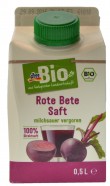-
Articles + –
Juice innovation in Germany is increasingly focusing on the process of lacto-fermentation, an ancient technique which recently has been rediscovered by consumer products. Lacto-fermentation, the most common type of fermentation, leads to a decrease in the level of carbohydrates and an increase in beneficial enzymes, various strains of probiotics and friendly bacteria. It thus helps to break down foods to a more digestible form.
Fermented foods and drinks are said to have numerous health benefits and play a notable role in digestive health. For some time now, traditional fermented vegetables, such as sauerkraut, have seen a revival, while fermented soft drinks in Germany, like Bionade and Fassbrause, have met a growing consumer desire for healthier, less sugary beverages. Driven by health players like DM and Alnatura, lacto-fermentation is also emerging as a claim of differentiation in the vegetable juice category.

Meanwhile, some fruit juice brands, also in the name of digestibility, have started to innovate around low acidic contents, with Germany leading “mild” juice launch activity in Europe. These alternatives to standard fruit juice varieties are marketed specifically as mild or low in acids. In Germany, Eckes-Granini is a major force behind mild juice launch activity due to the fact that the company also offers its most popular juice types in “mild” varieties, choosing selected fruit species that are naturally low in acidity and, thus, easily digestible.
In wider Europe, juice brands are also embracing the digestive benefits of probiotic bacteria, and highlighting the preservation of a whole fibre content of fruit and vegetables. The Swedish ProViva brand by Österlenmejeriet offers a range of still juice drinks containing Lactobacillus plantarum 299v bacteria, which are described as “the stomach’s best friend”. An new brand by Valio in Finland, introduced in 2016, centers on the importance of gut health and the beneficial impact of lactic acid bacteria on stomach wellbeing. The Valio Gefilus juices contain Lactobacillus rhamnosus GG lactic acid bacteria along with calcium and vitamin D that help to strengthen natural immunity.
Julia Büch is a Food and Drink Analyst at Mintel. She specialises in delivering insights on issues affecting the German food and drink market, providing analysis across a range of food and drink categories. Previously Trend & Innovation Consultant at Mintel, Julia was responsible for providing tailored product innovation analysis and client support primarily to Mintel’s German speaking clients.

Julia Büch is a Food and Drink Analyst, specialising in delivering insights on issues affecting the German market, providing analysis across a range of categories.
-
Mintel StoreGet smart fast with our exclusive market research reports, delivering the latest data, innovation, trends and strategic recommendations....View reports
-
Mintel LeapMintel Leap is a revolutionary new AI-powered platform that will transform your research process....Book a demo








































